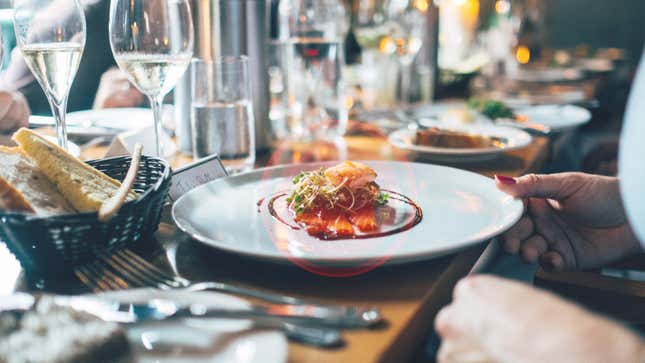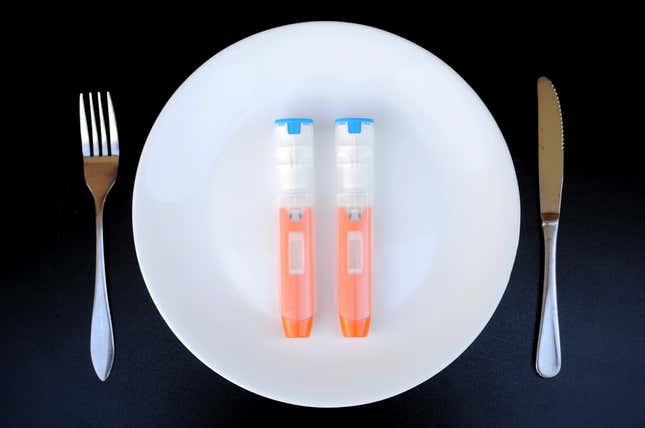
I have food allergies. Much more than you care to know, but I’ll tell you anyway: Fish or shellfish send me to the hospital with life-threatening anaphylaxis, hives, and terrible swelling. Raw tree nuts such as almonds or cashews provide a similar but less severe reaction. Quinoa is a newly emerging allergy for me that caused a recent outbreak of hives. Same for a coconut-heavy yellow curry. My most developed muscles are my histamines.
This doesn’t even get into the food intolerances (there’s a difference). Red meat not braised or well done won’t stay long in me. Same for oats and many wheat breads. Certain raw fruits and vegetables in large quantities cause severe throat discomfort. I can’t drink a glass of milk, but I can have cheese and butter... as long as I’ve taken medication. Eggs must be hard boiled or over-hard to be eaten alone.
Those are just mine. The near-limitless combinations of allergies, intolerances, and severities make accommodating the 15 million Americans with food allergies tricky. To add complexity, all of these permutations should be treated as life or death situations if encountered. No pressure!
Having two paragraphs worth of dietary restrictions can be inconvenient, but it’s not a death sentence for fun. I love great restaurants. My wife (sesame allergy) and I dine out frequently. Any reactions we’ve experienced have been the exception, not the norm. With preparation and communication, you raise your probability of a great dining experience, and avoiding something terrible happening.
Communicate early and often
The primary success factor for a reaction-free night out is clear and honest communication between the guest and the hospitality provider—this could be a restaurant, a caterer, or the host of a dinner party. The absolute dumbest and worst possible thing you can do is be sheepish about what you can’t eat. If you have the allergy, check your pride at the door and speak up.
This doesn’t mean you have to print T-shirts with “Nut Allergy!” emblazoned. You can do this discreetly. I highly suggest going to The Food Allergy Research and Education (FARE) website, where you can download and print out a card that can be presented to restaurant staff specifying allergies or intolerances—these cards also come in multiple languages. Speaking of eating internationally with allergies, my favorite tactic is to type “if I eat (insert allergies), I will die” into Google Translate, then show to the restaurant in the local language.
Stateside, I rely on two tactics: the restaurant’s reservation system, and the host stand. Platforms such as OpenTable allow you to type in your allergies. It’s best to mention this again if the restaurant calls to confirm the reservation. When you arrive, mention your allergies again to the host (they should know already), and the waitstaff when they greet you initially. I usually say “before we order, I have to mention some allergies.” Then offer your card or your descriptions. Do not be afraid to hammer this home.
If you’re at a dinner party or catered event like a reception, again, the earlier you can communicate the better. At any offsite reception, seek a manager. I’ve had more than one reaction at a wedding where the servers didn’t understand the allergy request—shame on me, in hindsight. If there’s nothing you can eat, that’s unfortunate. But given the choice between hungry at a party versus full at a hospital, I’ll choose the former.

Don’t make assumptions
As a restaurant-goer, never assume something does or doesn’t have what you’re allergic to, especially if you haven’t announced it to the staff. A garnish or sauce not shown on the menu could hide something toxic to your body. (Cross contact on kitchen prep surfaces is something restaurants should be especially mindful.)
I’ve had one or two major reactions due to this mistake, and one close call: I remember having to return a rib rack from a prominent restaurant chain upon learning they put fish sauce in their barbecue glaze. Seeing surprise cashews on a dish ruins both your meal and doesn’t do the restaurant any favors either.
“I’m still surprised there are guests that won’t tell us about an allergy until something arrives at the table,” said Leslie Lamont, general manager of The Publican in Chicago. “Our sauces and dishes can be pretty complex, so we encourage guests to not be shy. Even if it’s an off-the-beaten path ingredient, like a kiwi allergy.”
If and when this happens, politely explain and ask for something different—of course, mentioning what you can’t have. Sometimes the price of shyness is a second entree.
Seek attentive restaurants
Given the severity of my allergies, I’m selective about where I eat, especially for a nice meal. An eating experience is a hospitality experience, and restaurants with perspective and protocol on allergies tend to go the extra mile for their patrons. A lot of work unseen by guests goes into ensuring allergic patrons have a safe experience.
“We take it super seriously,” Lamont said. The Publican made allergy reviews part of its nightly menu review with the chef and staff, including a marked up copy of the menu indicating which dishes include major allergens, and which dishes can have certain allergens removed. “Our systems kind of developed organizationally over the last four to six years. We would get a lot of questions during the menu meeting. The chef and management team realized (the restaurant) needed to get ahead of problems.”
At the Chinese-American chain P.F. Chang’s, servers can generate a menu that lists what you “can” eat, when you provide them your allergies (the laminated and weighty menu is replaced with a customized sheet of printed copy paper). Funny enough, between mine and my wife’s allergies, there are exactly two entrees that meet our stringent criteria—fortunately we like both of them. Very generally speaking, larger restaurants (especially chains with multiple locations) are more likely to have a food allergies protocol in place. But there’s one way to be sure, and it goes back to my first point: Call and ask.
I won the geographic lottery by living in Chicago, with a high concentration of allergy-friendly restaurants. Last summer, Illinois became one of the few states that enacted rules to take food allergies more seriously, requiring restaurants to go through courses and training on food allergies. Fewer than 10 states have comparable measures, and selfishly I hope this becomes a federal mandate.
What can restaurants do?
The overall dining experience as someone with allergies really has improved over the last ten years. I’ve observed an uptick in concern and checking. Nevertheless, there are a few things I think restaurants and caterers can do to make a better experience:
- If your restaurant does nightly specials, make sure during staff pre-shift that servers knows every ingredient that goes in those dishes.
- Make the allergy ask part of the greeting, like announcing the specials, or asking if someone would like water.
- If your restaurant hasn’t already, consider taking part in the National Restaurant Association’s ServSafe Allergens online course. It’s a $22 write-off for your business that can save lives.
- Print out this poster (PDF link) and hang it in your kitchen.
- Be mindful about food cross contact on kitchen surfaces (which is different from cross contamination).
- Demonstrate care and understanding. Bring a manager over once you hear of an allergy concern. If not clearly understood already, the manager should hammer home any special instructions to the rest of the team.
- Regularly review staff protocol for food allergy emergencies. Because chances are it’ll happen.
Speaking on behalf of the 15 million Americans with food allergies: If our allergies are treated with care and urgency, we don’t get violently ill or worse, and we have a great meal, a restaurant is probably going to get our return business.